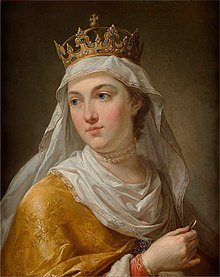Hedwig of Poland
| Jadwiga | |
|---|---|

Portrait of Queen Jadwiga by Bacciarelli, 1768–1771
|
|
| Queen of Poland | |
| Reign | 16 October 1384 – 17 July 1399 |
| Coronation | 16 October 1384 Wawel Cathedral, Kraków |
| Predecessor | Louis |
| Successor | Władysław II Jagiełło |
| Born | Between 3 October 1373 and 18 February 1374 Buda, Kingdom of Hungary |
| Died | 17 July 1399 (aged 25) Kraków, Kingdom of Poland |
| Spouse | Władysław II Jagiełło |
| Issue | Elizabeth Bonifacia |
| House | Capetian House of Anjou |
| Father | Louis I of Hungary |
| Mother | Elizabeth of Bosnia |
| Religion | Roman Catholic |
| Jadwiga of Poland | |
|---|---|
| King of Poland | |
| Venerated in | Roman Catholic Church |
| Beatified | 8 August 1986, Kraków, Poland |
| Canonized | 8 June 1997, Kraków, Poland |
| Major shrine | Wawel Cathedral, Kraków, Poland |
| Feast | 8 June |
| Attributes | Royal dress and shoes, apron full of roses |
| Patronage | Queens, united Europe |
Jadwiga ([jadˈvʲiɡa]), also known as Hedwig (Hungarian: Hedvig; 1373/4 – 17 July 1399), reigned as the first female monarch of the Kingdom of Poland from 16 October 1384 until her death. She was the youngest daughter of Louis the Great, also known in Poland as Louis the Hungarian, King of Hungary and Poland, and his wife, Elizabeth of Bosnia. Jadwiga was a member of the Capetian House of Anjou, but had more close ancestors among the Polish Piasts. She was canonized in the Roman Catholic Church in 1997.
Her marriage to William of Austria was planned in 1375 and she lived in Vienna between 1378 and 1380. Jadwiga and William were allegedly regarded as her father's favoured successors in Hungary after her eldest sister Catherine's death in 1379, since the Polish noblemen had paid homage to Louis' second daughter, Mary, and Mary's fiancé Sigismund of Luxemburg that same year. However, Louis died and Mary was crowned "King of Hungary" on the demand of her mother in 1382. Sigismund of Luxemburg tried to seize Poland, but the Polish noblemen countered that they would only obey a daughter of King Louis if she settled in their country. Queen Elizabeth then nominated Jadwiga to reign in Poland, but did not send her to Kraków to be crowned. During the interregnum, Siemowit IV, Duke of Masovia, became a candidate for the Polish throne. The nobles of Greater Poland especially favoured him, proposing he marry Jadwiga. However, the noblemen of Lesser Poland opposed his election and persuaded Queen Elizabeth to send Jadwiga to Poland.
...
Wikipedia
